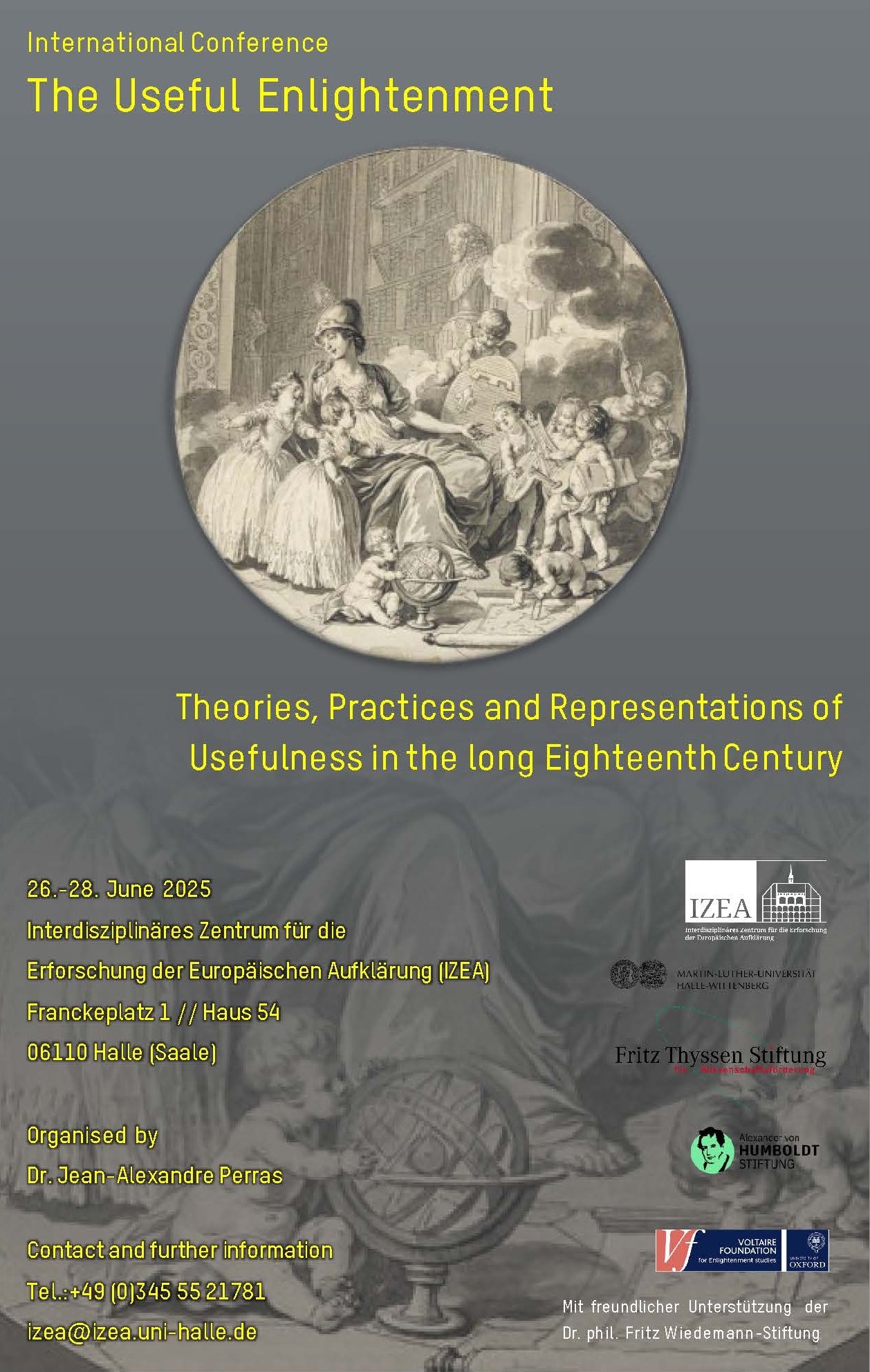
The Useful Enlightenment. Theories, Practices and Representations of Usefulness in the Long Eighteenth Century (IZEA, Halle-Saale)
Conference
The Useful Enlightenment
Theories, Practices and Representations of Usefulness in the Long Eighteenth Century
26-28 June 2025
IZEA, Martin-Luther University
Halle (Saale)
The very first question asked about a scientific project is often, What’s the use? The notion of utility has emerged as the criterion by which we regularly assess the relevance of scientific research, and is associated with potential applications and economic benefits. The close relationship between knowledge, utility, technological improvement and profit has a long history which crystallised during the Age of Enlightenment. Through an interdisciplinary and global approach, this conference will investigate the emergence, modalities, consequences, and limits of what is known as ‘useful’ knowledge.
Programme
Thursday 26 June
14h00 – Welcoming words by Elisabeth Décultot (Director of the IZEA, Halle)
Introduction, Jean-Alexandre Perras (IZEA, Halle)
Session 1 – Learned societies – Chair: Jean-Alexandre Perras
14h30 – Marie Thébaud-Sorger (Centre Alexandre-Koyré, CNRS, Paris): The invisible network of French sociabilities promoting the ‘arts’ in the 1780
15h00 – Giovanni Lista (IZEA, Halle): The Accademia Etrusca in Cortona: What public utility?
15h30 – Damiano Bardelli (EHESS, Paris): Learned Sociability as a ‘Useful Recreation’. Ideals and Practices of the Lausanne Literary Society
16h – Break
Session 2 –Chinese perspective – Chair: Despina Magkanari (CETOBaC -EHESS)
16h30 – Bichen Yan (Tsinghua University, Beijing / MPWIG, Berlin): The Failure of Usefulness: A Case of the Dissemination of Western Mining Knowledge in Seventeenth- Century China
17h00 – Monica Klasing Chen (Heidelberg University): Printed Garment Patterns in Late Imperial China: Textual Genres and Social Function
17h30 – Shih-Pei Chen (MPWIG, Berlin): From Elite to Common Knowledge: Tracing the Source Material of Chinese Daily-Use Encyclopedias with Digital Methods.
—
Friday 27 June
Session 3 – Ethics – Chair: Nicholas Cronk (University of Oxford)
9h00 – Kerstin Maria Pahl (MPIGD, Berlin): The Moral Ends of “Useful Facts” Statistical Accounts and Emotional Discourse in Late-Eighteenth-Century Britain
9h30 – Malcolm Quinn (U. Arts London): For Your Pleasure: Private Utility and Ethical Self-Knowledge
10h00 – Sándor Hites (Research Center for the Humanities, Budapest): An Apology for Unproductivity: Evaluating Intellectual Labor in Classical Political Economy
10h30 Break
Session 4 – Useful knowledge – Chair: Mikkel Jensen (IZEA, Halle)
11h00 – Martin Stuber (University of Bern): Usefulness as criterion for evaluating knowledge. The reviewer Albrecht von Haller in the transition to the scientific community
11h30 – Patrycja Bąkowska (University of Ponzan): (Truly) useful knowledge: On the Conversations and the Journeys of the Father and his Two Sons by Józef Wybicki
12h00 – Michèle Crogiez Labarthe (University of Bern): Botany and politics: when Malesherbes combined useful knowledge with the public good
12h30 – Lunch
Session 5 – Politics of usefulness – Chair: Giovanni Lista (IZEA, Halle)
14h00 – Andrew Kahn (University of Oxford): Virtue and Utility in the Russia of Catherine the Great
14h30 – Benjamin Marschke (California State Polytechnic University Humboldt / University of Trier): The Useful and the Useless: Theories, Practices, and Representations of Usefulness in King Frederick William I’s Prussia, 1713-1740
15h – Tibor Bodnár-Király (Ludovica University of Public Service, Budapest): Enlightenment Usefulness and the Practicalisation of Political Knowledge in the Mid- Eighteenth-Century Sciences of the State
15h30 Break
Session 6 – Economic Enlightenment – Chair: Martin Stuber (University of Bern)
16h00 – Regina Dauser (University of Augsburg): ‘Useful’ technologies for agrarian improvement at the Bavarian Academy of Sciences
16h30 – Lothar Schilling (University of Augsburg): Optimizing Land Use: Abolishing Fallows and Draining Wetlands as 'Useful' Practices of the Economic Enlightenment
17h00 – Jeffrey Wolf (Free University, Brussels): Utility and Improvement in the Applied Chemistry of Dr. William Cullen (1710-1790)
—
Saturday 28 June
Session 7 – Aesthetics – Chair: Gergely Fórizs (Institute for Literary Studies, Budapest)
9h30 – Stefan Uhlig (University of California, Davis): Aesthetic Utility in Smith, Hogarth, and Kant
10h00 – Alessandro Nannini (IZEA, Halle): Useful Uselessness. The Interesting as In-Between in the Aesthetics of the 18th Century
10h30 – Piroska Balogh (Eötvös Loránd University, Budapest): Utilitas aesthetica? A discourse on Johann Ludwig Schedius’ experiment to reconcile aesthetic value and social utility
11h00 –Break
Session 8 – Dissemination and publication – Chair: Benjamin Marschke (California State Polytechnic University Humboldt / University of Trier)
11h30 – Martin Urmann (Frei University, Berlin): Useful Sciences and Idle Paradoxes. An Epistemological Debate in the Rhetorical Prize Contests of the French Academies
12h00 – Alfonso Calderón Argelich (University of Lleida): The Contested Meanings of Utility in the Spanish responses to the Encyclopédie Méthodique (1782-1788)
12h30 – Thibault Debail (EHESS, Paris): What’s the use? Encyclopaedic knowledge and consultation reading in the eighteenth century (Western Europe, 1720-1780)
13h00 – General discussion and conclusion of the conference.